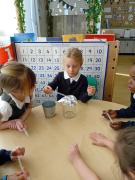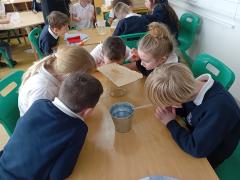Science
INTENT
At our school, we aim to inspire pupils’ natural curiosity and develop a lifelong interest in science. Children are encouraged to ask questions, explore the world around them and make sense of what they observe through first-hand experiences and practical investigation. Our science curriculum builds strong foundations of knowledge and understanding across biology, chemistry and physics, while developing key scientific skills such as enquiry, observation, prediction and reasoning. We promote aspiration by enabling pupils to see themselves as confident scientists, endeavour by encouraging perseverance and resilience when investigating and solving problems, and expression by supporting pupils to communicate their ideas, findings and conclusions clearly using appropriate scientific language. Through high-quality teaching and engaging learning opportunities, pupils are equipped with the scientific knowledge and skills they need to understand the world today and to prepare them for the future.
IMPLEMENTATION
At Hetton Lyons, science is taught in line with the National Curriculum and is underpinned by a carefully planned and coherent curriculum that reflects our shared vision for science education. A clear set of principles guides the planning and delivery of science lessons, ensuring consistency, progression and high expectations for all pupils. Our curriculum promotes aspiration by enabling pupils to see themselves as confident scientists, endeavour by encouraging curiosity, resilience and perseverance, and expression by supporting pupils to communicate their thinking clearly using scientific language, models and representations.
Science learning is carefully sequenced from EYFS through to Year 6, ensuring that pupils build knowledge and understanding over time. In EYFS, children begin by exploring and observing the world around them through first-hand experiences, developing early scientific language and simple enquiry skills. As pupils move through Key Stage 1 and into Key Stage 2, scientific concepts are revisited and built upon in increasing depth and complexity, allowing pupils to make connections, secure prior learning and deepen understanding.
Progression is clearly evident across the curriculum:
- Knowledge develops as pupils build secure understanding across biology, chemistry and physics, supported by the progressive use of scientific models including The Particle Model, The Force Arrow Model, The Energy Transfer Model and The Big Picture Model. These models provide a consistent framework for understanding and are revisited across key stages to deepen conceptual understanding.
- Skills progress through the explicit teaching of ‘Working Scientifically’ within every lesson. Each lesson includes a dual focus on scientific skills and substantive knowledge, enabling pupils to plan, carry out and evaluate a wide range of scientific enquiries with increasing independence and accuracy.
- Vocabulary is carefully planned and progressively introduced and revisited. Pupils are taught to use precise scientific language, building from simple terminology in EYFS to subject-specific vocabulary by Year 6, supporting clear communication and deeper understanding.
Pupils engage in a wide range of scientific enquiry types, including:
- Exploring and observing
- Asking questions
- Researching and communicating
- Classifying
- Identifying patterns
- Observing over time
- Surveys
- Comparative testing
- Fair testing
Children also learn about a diverse range of scientists and how their discoveries have impacted the world around them, raising aspirations and broadening understanding of future opportunities. Mathematics is closely linked to the science curriculum, enabling pupils to collect, record and interpret data and to construct tables and graphs. This structured and progressive approach ensures that all pupils meet the requirements of the National Curriculum while developing confidence, resilience and clarity in their scientific thinking and communication.
IMPACT
As a result of our carefully sequenced and well-implemented science curriculum, pupils at Hetton Lyons develop a secure and deep understanding of scientific concepts and processes in line with the National Curriculum. They leave each key stage with the knowledge, skills and vocabulary needed to think and work scientifically, building strong foundations for future learning. Pupils demonstrate aspiration by developing confidence in their scientific abilities and an awareness of how science can shape future study and career opportunities. Through regular investigation and enquiry, pupils show endeavour by working with curiosity, resilience and independence, applying scientific skills accurately and thoughtfully. Pupils are able to clearly explain their thinking, share conclusions and use precise scientific language, models and data to support their ideas, demonstrating strong expression. By the time they leave Year 6, pupils are confident, articulate and reflective scientists who are well prepared for the next stage of their education and for understanding the role of science in the world around them.























